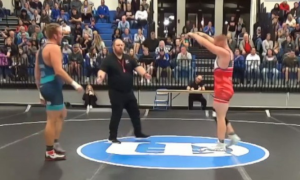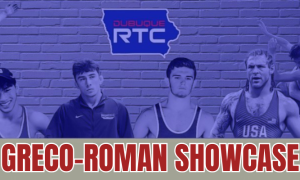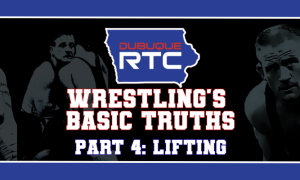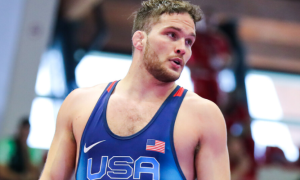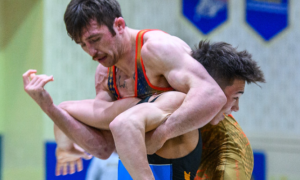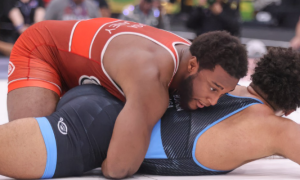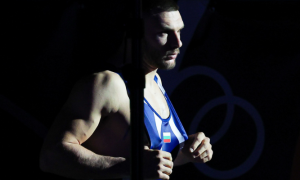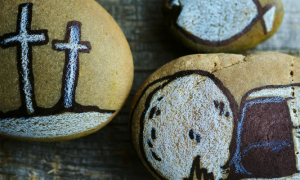Two decades later, the impact of the 1996 Atlanta Games can still be felt. Especially by those who took the mats.
Just 12 years earlier, the Summer Olympics were competed in Los Angeles and ushered in the most successful performance in American history. Four medals for Greco, including two golds, represented the dawn of a new standard. Prior to LA, the highest place any US wrestler had ever attained was fourth (twice; the late Ron Finley in ’64 and Brad Rheingans in ’76). ’84’s medalists reinvigorated hope for the style in the country. Athletes like Jim Martinez (bronze, 68 kg), Steve Fraser (gold, 90 kg), Greg Gibson (silver, 100 kg), and Jeff Blatnick (gold, heavyweight) were poster children for a rising program, even if the cloud of a Soviet boycott had proven too dark for some to ignore.
Two Olympiads had come and gone by the time the torch was lit in Atlanta, and any previous geopolitical hangups emanating from the Eastern Bloc were a thing of the past. The ’88 Seoul Olympics saw the US earn precisely one medal (Dennis Koslowski, bronze, 100 kg) and Barcelona’s Games produced two (a bronze for Rodney Smith at 68 kg and a silver for Koslowski at 100 kg). With the festivities coming back to America in 1996, time was of the essence. Atlanta needed to yield results.
A strong veteran presence anchored the ’96 squad. There were four Barcelona holdovers including one medalist. There was also a returning World Champion (Dennis Hall), a past World silver (Matt Ghaffari, ’91), and a talented young upstart who was beginning to prove he had what it took to shine on the international stage (Brandon Paulson). Poised to break through once and for all, the US Greco Roman Olympic Team used Atlanta as another opportunity to make history on American soil. Perhaps that’s why what happened inside of the Georgia World Congress Center 20 years ago is still remembered so fondly to this day.
Paulson, Hall, and Ghaffari, the three medal winners from that team, are now living legends in the sport. The head coach of that ’96 team, Rob Hermann, would go on to help lead the 2000 Sydney squad as well as continue coaching in a variety of roles — and is currently at the helm of USA’s primary developmental program, Northern Michigan University’s Olympic Training Site. We talked to all four of these gentlemen to gain their perspectives of the ’96 Olympics and how it stood out to them.
1996 US Greco Olympic Team – Paulson, Hall, and Ghaffari Remember Atlanta
The motivation of being home
Only a little over a decade separated Atlanta from Los Angeles, the last time the Olympic Games were held inside of the US. Even still, there was no denying that the prospect of having a sort of home field advantage played on their minds. Especially for Matt Ghaffari, who was around in ’84 on the freestyle side as an alternate to Bruce Baumgartner.
Brandon Paulson: I think the Olympics for me was always something I had dreamed about. And when I was the number two guy in ‘95 I was like, I’m close enough, I’ve got to do this now. You never know when it’s going to be. Obviously, it was an amazing experience being in the United States, but the motivation was really to try and be an Olympian and participate in the Games.
Matt Ghaffari: When we were getting ready for Atlanta, my memories of Los Angeles compared to Barcelona, where no one spoke English, being at the home country I could wrestle in front of my doctors who operated on me, my teachers, my high school, my college, my club coaches, family members. I had 100 people with me in Atlanta, almost half a hotel.
Dennis Hall: A lot of my friends and family members could come watch me compete. My first Olympics (in Barcelona), I only had my mom and dad there, so it was great having my family and friends down in Atlanta where I could see them and talk to them while I was competing and let them share in the experience.
Coach Rob Hermann: Maybe for our guys there was motivation, but we didn’t take anything for granted because it’s the Olympics. You know, we’ve had other places where we should have done better and there’s a lot of politics involved and you don’t always get the call. But we had a great training camp. We had Dennis Hall on the team, Matt Ghaffari. It was a veteran team going in and the guys knew what they had to do. They created their own breaks and they came to wrestle, but nothing was given to us.
Matt Ghaffari: It was so motivating that I resigned from my job as an assistant coach at Arizona State University. I coached there for ten years. I moved my family to Colorado Springs in 1994 so I could for two years solely focus on shining in Atlanta.
Coach Rob Hermann: I like to think that the crowd helped them, not having to travel overseas, staying on their diets, and wrestling in front of their fans and family had to be a motivation.
The dorming life
It cost Atlanta around $1.2 billion to put together the primary infrastructure so the Games could be held. A substantial portion of these funds were used to build the housing in the Olympic Village, which would later be used as dorms for students of Georgia Tech University. The Greco team held their pre-Olympic training camp in Chattanooga, Tennessee approximately 118 miles away. Some athletes, like Ghaffari, preferred to stick it out at the training camp site until competition while others, like Hall, set themselves up a little differently. In other words, the Olympic Village experience was something to be enjoyed later on.
Hall: I didn’t step foot inside the Olympic Village. We stayed at a hotel when we got to Atlanta. Even during the competition, I stayed outside at a hotel. My wife was eight and a half months pregnant at the time with my first child and I wanted to be close in case she had the baby.
Ghaffari: In Barcelona, I enjoyed myself because of being in the Village and overseas. But Atlanta, until my competition, we stayed in Chattanooga. We drove down for the Opening Ceremonies, then we drove back to Chattanooga so we could keep training. Once we got to the Village, I don’t think I left my room. I didn’t want to go to the big cafeteria or anything, so I pretty much stayed in my room until I was finished competing. I told my family members I would talk to them after my match. I didn’t want to know about tickets, where to stay, etc. I was laser-focused and I was in my Olympic dorm like an animal locked in a cage until it was time to compete. It will be time for fun after I win my medal.
Hall: The hotels were fine. The hotel wasn’t a total rip-off, it was relatively reasonably priced. They gave us a good deal.
Paulson: We wrestled like the second or third day of the Olympics. It was the fourth, maybe. I was done by the fourth day and they had probably like 16, 17, 18 days left, so at 22 years old and the Olympics being what they were for me, I had been dreaming about it since I was ten, I wanted to stay the whole time. It wasn’t like staying in luxury, they were college dorms. You had a bathroom between eight people and a roommate, but I didn’t care. To me, it was an amazing experience and just to be in the Village was awesome. I really enjoyed the Village and stayed as long as I could until they kicked me out.
Hermann: To me, it’s once in a lifetime. I was part of ‘92, but I didn’t stay in the Village. And then I was head coach in ‘96 and head assistant in 2000. And when you’re part of it, you’ve got your credential, you get to see all these athletes, Muhammad Ali came in. He might have came in 1996 but 2000 for sure I noticed him, and I got to take some pictures with him. You know, just things like that, people you were seeing you normally wouldn’t see. It’s the one time every four years all the sports get together. Otherwise, the World Championships are in different areas, different countries. So it’s pretty unique.
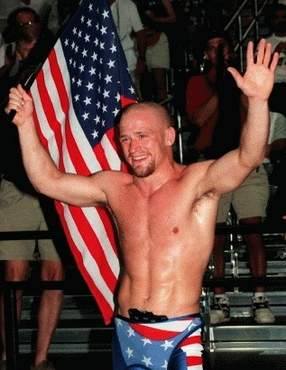
Hall following the ’96 Olympic finals.
The competition
As a returning World Champion, Hall entered the 1996 Olympics as a favorite. Ghaffari wasn’t too far behind, having by now etched out a spot as one of the top heavyweights on the planet. Paulson was the unknown out of the three. The University of Minnesota wrestler had been successful on the age-group level and even made some history as being the first high schooler to make a Senior National Team. By the time the tournament was midway through, Paulson, along with Hall and Ghaffari, appeared to be on the verge of history yet again.
Unfortunately, neither of the three would win gold in front of the home crowd. Paulson electrified the crowd throughout his run, but was ultimately defeated by Armenian (and Bulgarian) legend Armen Nazaryan. Hall fell to Kazakhstanian rival Yuri Melnichenko, who he had beaten in the World finals the year before. The referee had awarded exposure to Melnichenko, resulting in a controversial call that changed the match. Ghaffari, facing the daunting two-time Olympic champ from Russia, Alexander Karelin, dragged the monster into overtime before dropping a heartbreaking 1-0 decision.
While coming so close and not taking gold was crushing, the blow was slightly softened by the warm reception the fans inside of the arena rained down on the athletes. Not that it was necessarily bittersweet. Ghaffari could barely contain his disappointment following the loss to Karelin, for example. But in the context of what the athletes were up against and the fact they put in such memorable performances, families and friends took some of the sting off. At least a little bit.
Hall: My first round I was wrestling the Turk. I’m picked to win it, he’s picked to take second. A lot of people had him taking second behind me, not Melnichenko. He was wrestling great. The final was supposed to be me and him because of the blind draw.
Paulson: I had to cut quite a bit of weight, but I weighed in early so I could watch Dennis Hall compete because I was so excited about the Olympics. I was excited to watch our guys wrestle, so I made weight early. I couldn’t step on the scale yet, but I was down to weight just so I could watch and get excited. And I really think that helped me even though, you know, it probably didn’t help my body. But it helped my mind. I was like, You know, this is the Olympic Games, I’m watching these guys fighting their tails off to become gold medalists and I get to wrestle tomorrow.
Hall: I had to beat Sheng Zetian (CHN) in the semis. He was a stud, he was a three-time bronze medalist. I beat him 1-0. It was a dogfight, man. All of the competition is, it doesn’t matter who you’re wrestling, these guys are there to win it. The biggest thing is, people don’t get how tight it is. You’ve got ten guys in a weight class who could win the tournament. More than ten. And that’s the tough part about the Olympics, the competition is so tough and it’s so close. It’s who has the best day is going to end up winning the damn thing.
Paulson: A lot of times when you watch the Worlds and the Olympics, they have those escorts to walk you to the mat. And I told my escort, “You’re going to have to stay with me because I’m ready, I’m sprinting out to the mats.” So I ran out to the mat and the crowd was just so pumped, chanting “USA.” I don’t know how many people were there, it wasn’t a very big arena. But when the USA guys came up they went crazy. It was exciting to get out there. I’m lucky it was a short match because I spent a lot of energy before the match with my excitement. Luckily, I got him in my trademark move that I’ve been doing since I was eight years old, which is a hip toss, and got a pin. Then I just started rolling.
Hall: I had to just be respectful to everyone who came to watch and support me. It wasn’t that it didn’t hurt like a son of a bitch, because it did. The reality is that I wanted to beat the shit out of Melnichenko. But the truth is, that is what I deserved that day according to the referee’s eyes. You know what, it probably took me a couple of years to get over it and move on. After that match, I knew I had to go on competing for a while to try and win it. It wasn’t like my career was over, that’s probably why it was a little easier for me. I was only 25 years old and I knew I had another chance or two to try and win it.
Paulson: Going into the finals I was still confident. I had wrestled Nazaryan before and it didn’t go too well. I wrestled him in the Junior World finals three years earlier. I knew I was in for a tough match, but I was still confident I could continue my roll. He had the best reverse lift in the world, maybe the best ever next to Karelin and I was really prepared for that. He actually hit me with a straight lift and it surprised me a little bit. He was so strong. He was a big 52 kilo guy as well, and I couldn’t break through.
Ghaffari: I was devastated over my loss but I think I did my best. I could look myself in the mirror and try to take care of my family. I was sad and crying in the stands for letting my country down but the response from the American fans, my family, coaches, and other athletes said it was a great tough match. And also, that I improved a lot from the guy who couldn’t win his state, couldn’t become an All-American in college, had to change colleges to get better competition, and couldn’t make the Olympic team in freestyle. It was a cherry on top of my career.
Hall: I had a lot of people from Wisconsin there to watch and I wanted to celebrate with them. To me, even though I was hurting, it was more important to let them be part of the experience and me not be a sourpuss, I guess.
Paulson: I didn’t win and of course, you want to be a gold medalist. I was disappointed, but really, I gave everything I had, I trained right, did everything right, and I won a medal in the Olympics. It was an amazing experience to me. So I wanted to win. You always want to win a medal in the Olympics and you don’t know when you’re going to get that opportunity. Even though I was young, I never got that opportunity again, so it was awesome. I loved it.
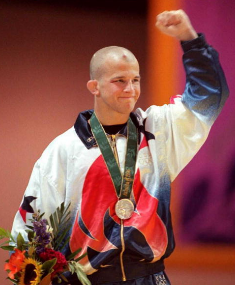
Paulson on the podium. (Photo: George Gobet/Getty Images)
Terror strikes
Centennial Olympic Park was designed to be an meeting spot for the athletes and international contingents during their time in the Olympic Village. Coming in at a cost of $28 million, the park represented a meaningful common ground to its visitors. But on July 27th, that all changed, at least temporarily. As crowds of people converged for a musical performance, three pipe bombs were detonated. All told, two died with another 111 injured from the blast. The events not only cast a tragic undertone on the Games, but almost threatened them entirely. The US Greco team had just finished competing days before and several of them were still around when the bombing occurred.
Hall: I was kind of shocked because I knew I had been down there the night I had won my medal. We went down to the Centennial Park and were kind of just walking around and hanging out with family and friends. I believe it was a few days later they had the bombing, and when it happened I felt sorry for the people initially right away who were injured and just hoping they would be okay.
Ghaffari: I was asleep. It was 1:00am. My family and I were scheduled to fly back the next morning and I got a beep. We all had pagers from Motorola and we all got a beep to report in to our team leaders. Everyone in our village knew something had happened because of the game plan in case there was a terrorist attack.
Paulson: We were having a lot of fun everyday. It was a lot of Jason Gleasman and I, and Dan Henderson would come with. We’d go to an event during the day and then go out at night. We had a lot of fun, we danced, and it was a dream of all of ours and I lived it up and had a lot of fun. So I didn’t even hear about it right away. I was coming back into the Village and I heard about it walking back in.
Hall: It put a little concern on the rest of the Games because you just never know if it would happen again and if more people were going to get hurt. At the same time, I know the security at the Olympics is usually pretty-darn tight. There’s guards everywhere with guns and things like that. I just mainly felt sorry for the people who were injured.
Ghaffari: I wanted the Olympics to move on and the best thing I could do was change our flight to show that we were not scared and weren’t going to let the terrorists win. The day after that, to put humanity ahead of sport, I took my medal to the hospital visiting bombing victims and I was part of the first people to open the bomb site at the park. Just because the healing process was so strange, like it is now. But we had to stick together and not let the terrorists win. All they wanted to do was to disrupt and scare, so don’t get scared.
Paulson: Really, I felt anger as much as anything. I was like, How could anyone try to ruin something like the Olympics that’s bringing countries together? You’ve got Iranians, Russians, Chinese, North Koreans and Americans, especially in wrestling. And after the match it’s a hug and a “Great job”, and then somebody is trying to ruin that experience? It’s unfortunate that’s what people tend to remember, that Atlanta is where the bombing was. I was concerned if people were hurt, but I was angry.
How Atlanta lives on 20 years later
Every Olympiad is memorable for the athletes involved, but when it takes place in your home country, there is a little more that seems to stick out. The three silver medalists and their coach may have continued their careers following these games, but the experience overall is one that has stayed with each one of them, and in different ways.
Hall: There’s nothing like wrestling in your home country and winning a medal. For me, I had a ton of fun visiting with family and friends and them being able to see me compete. In my mind, it’s one of the best sporting events in the World, you know?
Hermann: Winning the three medals, I told (US National Team head coach Steve) Fraser, “Can you believe what we just did?” We won three medals, for Greco. So I said, “We’ll be looking for a pay raise after this.”
Ghaffari: I don’t know if the Atlanta Olympics changed my life. Just competing against Karelin for ten years and losing a lot but getting closer each time made me a better human being, a better person, for not giving up. In Atlanta, the match was close, it went to overtime, eight minutes. He didn’t score on me, but mentally I made a mistake. It’s just like boxing. You can’t tie the champ, you have to beat the champ.
Hall: The time I had there was a lot of fun with my teammates. When you’re an Olympian and you have your teammates, you know you can call them any time. It’s pretty awesome, the bond that you forge with those guys. When you make an Olympic team, you train together for two to three months straight. And that bond makes you close. I mean, I still talk to a lot of the guys on that Olympic team. We had a 20 year reunion at the Olympic Trials this year, and that was cool getting to see those guys from Atlanta.
Hermann: Everyone wrestled to what they should have wrestled to. Nobody got roped, or taken or robbed. Everyone did what they were supposed to do. Brandon Paulson winning a silver medal, he might have been the dark horse because he never medaled before prior to that. But Dennis Hall won the Worlds the year before and Matt Ghaffari medaled before, too.
Just being in their corners and being part of it, watching the guys grow through their camp. And we set our goals. Our goals were to place in the top three as a team, and I was shooting for seven medals. And you say, Why seven? Well, if if I said three, I’d have six other guys looking at me like, What, you don’t believe in me? So we set our goals pretty high and we came away with three medals. I thought it was a great performance and lived up to our expectations.
Paulson: I can look back at those pictures and still remember the feeling. I was jumping around the mat and showing my emotions. You know, they say to act like you’ve been there, but I hadn’t (laughs). I had just won an Olympic medal. The crowd was just deafening. Even when I was running out for the semis, the stands were shaking, the platform was shaking. It being in the US, God, it was so awesome. I wish everybody could have that feeling. It was unbelievable.
————————————-
Brandon Paulson, who took an Olympic red-shirt to compete at the 1996 Olympics, was only 22 when he stepped on the mat against Nazaryan. Paulson continued dominating his weight on the Senior level domestically and earned a World silver medal in 2001 to go along with a litany of other titles. When he finally called it a career, Paulson quickly became a standout coach on the national level, joining the staff on the famous Minnesota Storm team that has been a fixture in US Greco Roman wrestling for over 40 years. He is also the co-director of the highly-successful Pinnacle Wrestling School in Shoreview Minnesota. In 2008, Paulson was named the National Greco Roman Coach of the Year by USA Wrestling, and in 2013 was inducted into the Alan and Gloria Rice Greco Roman Hall of Champions.
Matt Ghaffari met up with Karelin once again in the 1998 World Championships, losing via fall. His last foray into full-time competition culminated with his best-of three against Rulon Gardner in the 2000 Olympic Trials final. Gardner prevailed in that series and later became the first man to defeat Karelin in over 13 years. Ghaffari later realized his goal of competing in four different decades in October of 2010, when he wrestled at the Sunkist International Open. He eventually earned his MBA and today is the Business Development Manager for OSPORTS, a division of Osborn Engineering. Ghaffari was inducted in the National Wrestling Hall of Fame as a Distinguished Member in 2013.
Dennis Hall continued wrestling, making one more Olympic team eight years later in 2004. To clinch his spot on the squad that went to Athens, Hall battled 1996 teammate Brandon Paulson. Their final bout in the best-of-three series lasted nearly 17 minutes and is widely considered the greatest wrestling match in US history. Since that time, Hall has become one of the most popular coaches in the sport thanks both to his school, World Gold Wrestling and his status as one of the most in-demand clinicians in the country. He is also one of the founders of the online wrestling platform World Wrestling Resource and is currently working on launching a functional strength program called SPIKE along with noted physical bio-mechanics trainer Joel Berens. Hall was inducted in the National Wrestling Hall of Fame as a Distinguished Member in 2011.
Rob Hermann was the Head Assistant Coach for the 2000 Sydney Olympics and stayed involved in coaching on numerous levels, including at one point leading both the US Junior and Cadet World teams. He is still at it today as the head coach for the Northern Michigan-Olympic Training Site, presiding over the top collegiate-aged Greco Roman wrestlers in the country. Under Hermann’s watch, the NMU-OTS program has been responsible for numerous National and World teams at every age-group level, including Senior. In addition, Hermann has been honored as a two-time National Greco Roman Coach of the Year (1992 and 1996).

Notice: Trying to get property 'term_id' of non-object in /home/fivepointwp/webapps/fivepointwp/wp-content/themes/flex-mag/functions.php on line 999


